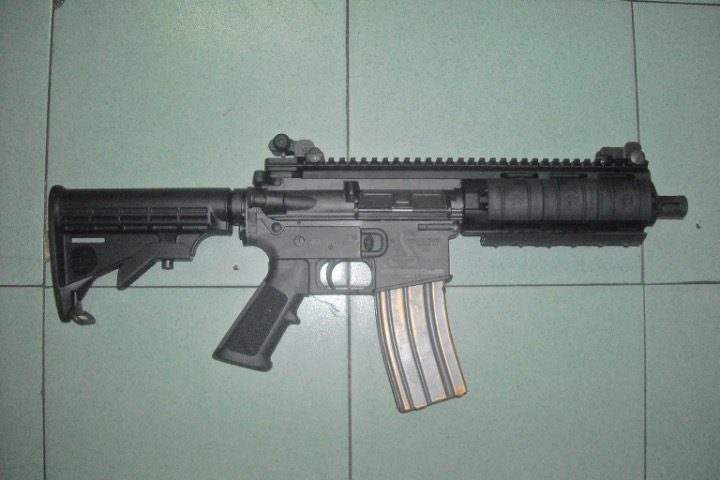
In his ruling in United States v. Chan, Derrick Kahala Watson, Obama-appointed U.S. district judge for the District of Hawaii, claimed earlier this month that since the short-barreled rifle fitted with a switch that turned it into an automatic firearm possessed by Christopher Chan is not in common use in the United States today, the Second Amendment doesn’t apply.
During a welfare check in 2022, police found a bag in the trunk of Chan’s vehicle containing a short-barreled rifle fitted with a conversion switch. For that, he was charged with both possession of an unregistered short-barreled rifle and possession of a machine gun. Both are violations under the National Firearms Act of 1934 (NFA).
Second Amendment Rights Violated
Chan filed a complaint that his Second Amendment rights were being violated. He claimed that 1) short-barreled rifles are “arms” within the plain text of the Second Amendment; and 2) Hawaii cannot provide a Founding-era analogue (as required under Bruen) that is “relevantly similar” to the provisions of the NFA regulating them.
It should have been an easy reach for Judge Watson to rule in favor of Chan and toss the charges. But no — he had to find a way around Bruen. Watson correctly noted the challenge he faced:
[W]hen the Second Amendment’s plain text covers an individual’s conduct, the Constitution presumptively protects that conduct. To justify its regulation . . . the government must demonstrate that the regulation is consistent with this Nation’s historical tradition of firearm regulation.
Only if a firearm regulation is consistent with this Nation’s historical tradition may a court conclude that the individual’s conduct falls outside the Second Amendment’s “unqualified command.”
Crafting a Workaround
Watson did find that Chan is covered under the Second Amendment as a citizen enjoying his Second Amendment rights in general. However, he determined that since other courts in the past had ruled (prior to Bruen) that a short-barreled rifle is “dangerous and unusual,” Chan isn’t entitled to protection for that:
The Court [finds] that both short-barreled rifles and machineguns are “dangerous and unusual weapons” outside the protection of the Second Amendment….
Weapons that are “dangerous and unusual” are not “in common use” and therefore do not fall within the scope of the Second Amendment.
The court found various rulings that comported with his decision:
Joining every other district court to have considered this issue in the wake of Bruen, [this] court agrees with the government that short-barreled rifles are “dangerous and unusual weapons” that fall outside the protection of the Second Amendment.
That included a pre-Bruen ruling in United States v. Henry, decided in 2012. In that, the notoriously anti-2A 9th Circuit held that:
… because “machine guns are highly ‘dangerous and unusual weapons’ that are not ‘typically possessed by law-abiding citizens for lawful purposes’ … the Second Amendment does not apply to machine guns.”
Pre-Bruen Didn’t Matter
When Chan’s attorneys reminded Watson that Henry was decided under the old jurisdictional landscape that was altered by Bruen, Watson responded:
There is no indication that Henry is “clearly irreconcilable” with Bruen.… As a result, Henry remains binding precedent, such that this Court must find that machineguns are “dangerous and unusual weapons … not entitled to Second Amendment protection.”
That left Chan’s attorneys to prove to the court that such weapons were in fact in common usage. Watson thus avoided having to find any such infringements imposed on firearms in the Founding era. He “flipped” the argument, requiring Chan to prove his case rather than Hawaii having to prove its case.
Chan’s Lawyers Did the Best They Could
Chan’s lawyers labored mightily in the losing cause, but Watson had them where he wanted them. He tossed aside as irrelevant any proof they provided about machine guns and short-barreled rifles:
The number of machineguns, in the abstract, does not establish such weapons are in common use by law-abiding citizens….
This amount [741,146 lawfully registered and possessed machine guns] remains too insignificant for machineguns to be considered in common use….
As Fredy Riehl, editor-in-chief of Ammoland Shooting Sports News, wrote:
The real problem here is that the judge is conflating two different parts of the legal test. After acknowledging that the Second Amendment applies to “arms,” he should have shifted the burden to the government to prove that these firearms can be banned based on historical tradition.
Instead, he flipped the script and put the burden on Chan to prove these firearms are in common use. This is a clear misapplication of legal principles set forth by Supreme Court cases like Heller and Bruen.
This decision is ripe for appeal.